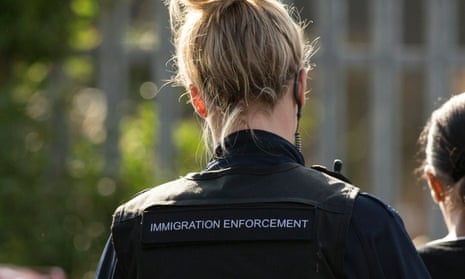The British government is separating children from parents who have been taken into immigration detention – the practice that brought worldwide condemnation for the Trump administration.
Scores of children – and possibly hundreds – are separated from a parent or carer in the UK every year, according to a charity that challenges immigration detention.
Bail for Immigration Detainees (Bid) has so far this year represented 155 parents who have been separated from a child or children while in immigration detention in the UK. The charity usually handles about 170 cases a year.
While current Home Office guidelines state that children should not be separated from a parent if that results in the child being taken into care, Bid says this has happened to three families in the last 16 months.
In two cases, fathers were taken into immigration detention after local authorities warned that the children’s mothers were unable to care for them alone, and that the children would need to spend their childhoods in care. Both men were eventually bailed.
In a study published in 2013, Bid studied a sample of 111 parents who had been separated from 200 children over a three-year period. The average period of detention had been 270 days.
Almost half the 200 children were placed in foster or local authority care during their parent’s detention. In 92 cases, the parent was eventually released. In 15 cases, however, the parent was deported or removed from the UK without their child.
In follow-up research in 2014, Bid studied a sample of 47 immigration detainees, and found that 11 were removed or deported without their children.
The charity stresses that it cannot be sure of the total numbers of parents and children who are being separated in this way each year. The Home Office did not provide a statement or respond to requests for information about the numbers.
Bid says that in most of the cases it handles, the children’s second parent is not in immigration detention. It has represented single parents who have been in detention facing deportation, however, and cases where both parents have been separated from their children and detained pending deportation.
Celia Clarke, director of Bid, said: “What has been happening in the United States with families arriving at the border being forcibly separated is utterly reprehensible.
“But in the UK we do not have the moral high ground. Our government has been separating parents from their children for the purposes of immigration control for years. Parents are detained with no time limit on that detention and no automatic legal representation, leaving their children in the community.
“The impact of this is devastating and long-lasting. Children of parents we have supported regressed, developed behavioural difficulties and suffered from night terrors. The enduring legacy was a constant fear that their parent or parents might be taken from them again.”
There appears to be limited awareness, even within government, of the extent to which the government’s “hostile environment” strategy for migrants has resulted in children being separated from a parent.
James Cleverly, the MP and deputy chair of the Conservative party, representing the government in a Radio 5 Live discussion in June, said: “We don’t do this in the UK. We have a very family-focused detention regime.”
In fact, the Home Office issues guidance to staff who are engaged in splitting up families through immigration detention and deportation. The latest version, issued last December, is entitled: “Family Separations.”
Case study
AA was detained after overstaying his visa. His son, a British citizen, was born while he was detained and taken into the care of the local authority due to the mother’s inability to care for him without support. She suffered from depression and had a history of self-harming. Before the birth, the local authority had warned the Home Office that the baby would need to be taken into care, and urged that AA be “released from detention without delay”.
During subsequent court hearings, the Home Office argued that because AA had been in detention when boy was born, he had had no meaningful involvement in the child’s life, and so there was no legal barrier to his removal. According to Bid, the Home Office also said it considered it “reasonable and proportionate” for the child to be separated from his father and spend his childhood in care.
A stay on AA’s removal from the country was eventually granted, and he was released after nine months in detention. The local authority said it was more than happy for the child to live with his mother, as long as AA was also there to support the mother.
